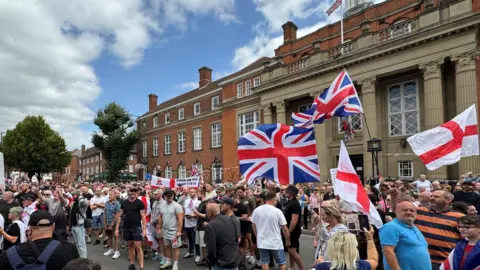On a recent Saturday, the town of Nuneaton witnessed a significant anti-immigration demonstration that attracted hundreds of participants. The protest, which took place outside the Nuneaton Town Hall, was characterized by a vibrant march through the town center, where attendees waved flags, carried placards, and chanted slogans expressing their views against immigration policies. This event was part of a broader series of protests organized across various cities in England, reflecting a rising wave of discontent concerning immigration issues.
The demonstration in Nuneaton was reportedly fueled by recent allegations involving two asylum seekers. Warwickshire County Council leader George Finch revealed that these men were charged with the grave crime of raping a 12-year-old girl, a claim that the BBC has yet to independently verify. This revelation intensified existing tensions within the community and was pivotal in rallying protestors who voiced their concerns about immigration and safety.
As the protest commenced at around 1:00 PM BST, participants prominently displayed the England flag and the Union Jack while chanting messages that critiqued government policies and called for action to address their grievances. By 3:00 PM BST, the majority of protesters began to disperse, having concluded the event without reported incidents of violence. The nature of the demonstration suggested a largely peaceful gathering, despite the charged atmosphere surrounding the topic.
Notably, the gathering attracted the attention of Warwickshire Police, who maintained a visible presence to ensure order. Officers engaged with a small faction of counter-protesters who attended in opposition to the anti-immigration sentiment. These counter-protesters faced some difficulties as they were reportedly isolated by the larger contingent. The event’s organization was linked to Mr. Finch’s accusations against both Warwickshire Police and the Home Office, alleging they were obscuring the immigration status of the suspects charged in the disturbing case.
Further complicating the situation, Nigel Farage, the leader of the Reform UK party, capitalized on the tensions by calling for police forces nationwide to disclose the immigration status of individuals charged with serious crimes. The broader implications of such statements raise questions about the intersection of criminal justice, immigration, and public safety.
The backdrop to these protests included a broader array of demonstrations across the country, including significant protests in major cities like Bristol, Bournemouth, and London, highlighting a wider national dialogue on immigration policy and public concerns over safety. Specific instances of unrest, such as a police operation that resulted in over 200 arrests during a demonstration in support of the group Palestine Action in London, illustrate how the immigration debate is interwoven with other socio-political issues in the UK.
Moreover, the two men at the center of the Nuneaton protests, Ahmad Mulakhil and Mohammad Kabir, faced serious allegations involving an incident that occurred on July 22, where charges of rape, kidnapping, strangulation, and aiding and abetting a sexual crime against a minor were levied against them. Following the ongoing controversy and protests, Warwickshire Police reiterated their adherence to national guidelines, which ultimately advise against sharing personal details such as ethnicity or immigration status once a charge is made.
The events in Nuneaton reflect not only localized concerns but also resonate with broader national anxieties surrounding immigration, crime, and community safety. In navigating these complex issues, demonstrators and local authorities alike must tread carefully, balancing the need for public security with the rights and dignities of all individuals involved. This balance is crucial for fostering a just society while addressing the concerns of residents feeling vulnerable in the face of crime and societal changes.











